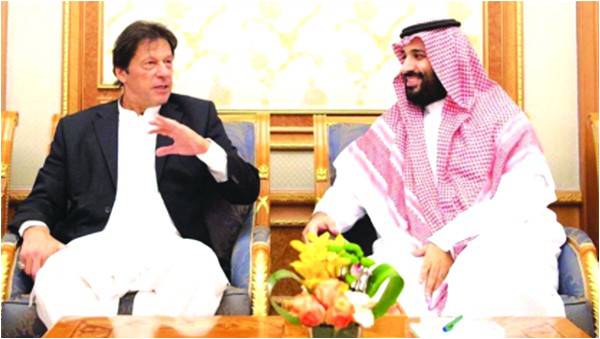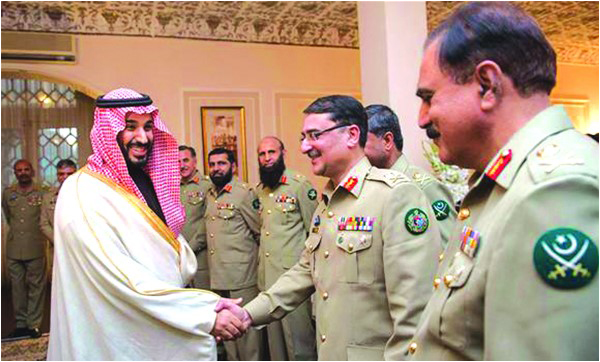
As Pakistan’s infatuation with China-Pakistan Economic Corridor (CPEC) begins to wear off, Saudi investment is being projected as the new ‘game changer’ for country’s struggling economy.
The Saudis initially provided some temporary relief by giving $3 billion in balance of payment support and promising the same amount in oil on deferred payment facility. But the next big thing is the investment the Saudis are planning to make in Pakistan. Various figures about the planned investment have been floated in the media, but it is expected to be between $10–12 billion in oil, renewable energy and mineral development sectors. A refinery to be established by Saudi oil giant Aramco is going to be the center-piece of the Kingdom’s investment here.
Many are already dubbing the expected Saudi investment as the biggest ever by the Kingdom in Pakistan and several comparisons have also been drawn with Chinese investment in CPEC.
The agreements to formalise these investments are planned to be signed during the two-day visit of Saudi Crown Prince Muhammad bin Salman over this weekend (February 16-17). Royal visits from Saudi Arabia to Pakistan have always been spectacular, but the upcoming trip has been made special because of the expected investment that it will bring along with it.

Prince bin Salman’s delegation, which may be close to 1,000 members in size, importantly includes some 40 private investors. There has been a pre-tour party as well and the most high profile figure among them, who has been doing most of the preparatory work is the head of Islamic Military Coalition to Counter-Terrorism (IMCTC) Gen (R) Raheel Sharif. The former army chief has met many in Islamabad from legislators to the foreign minister Shah Mahmood Qureshi and Chairman Senate Sadiq Sanjrani and from Army Chief General Qamar Bajwa to Prime Minister Imran Khan.
Saudi investment and economic help, especially in these difficult times we are passing through, is more than welcome. However, a nagging question that has been bothering many is that what the Saudis are expecting from Pakistan in return.
The Saudis were not too happy when the results showing PTI in the lead in last general elections came because of reasons well known. However, putting aside their disappointment, they immediately reached out to Khan to connect with him. Building the relationship proved easier than what Riyadh had expected. The cash-strapped new government was looking for an economic lifeline and the Saudis were more than happy to offer that.
Prime Minister Imran Khan, notorious for his U-turns, broke his pre-election pledge of not travelling abroad in first three months of his government and set off for Riyadh within a month of landing in office to seek financial assistance so that an impending balance of payment crisis could be averted and external payment obligations could be fulfilled.
The strategy worked and not only the Saudis helped, but the Emiratis chipped in too. Thus, the new government got a breather and it is now beholden to the kind and generous Arab brothers.
The Pakistani part of the deal, therefore, is not too difficult to understand. But the big question is that what are the Saudis aiming at and what their strategy is. The balance of payment support, oil on deferred payment, and now investments are more than a charity for a struggling Muslim brother, all of this has a strategic value and attached objectives.
It is not an unfounded concern. “Gwadar Port is a very crucial port in the region and also the nucleus for trade and investment. We also spoke about the feasibility of an Aramco refinery. Aramco will be a huge refinery in Gwadar. We also had other areas in Pakistan for refinery. However, Saudi Arabia preferred Gwadar for the purpose of having its refinery there. Gwadar is the best from the strategic point of view,” Saudi Minister of Energy and Industry Khalid Al-Falih said in a media interview while explaining the choice of Gawadar for setting up of the refinery.
Choice of Gawadar is not a simple one. It is one of the nodes of CPEC and is located in close proximity with Iran’s Chahbahar Port.
Clearly there is a rational strategy behind the move. Whether it is economic or geo-political, it remains to be seen. One assumption is that Saudis by buying off influence in Pakistan intend to assert their position in the region.
We ought not forget what Barnett Rubin, a former UN adviser on Afghanistan, recently said about the Saudi largesse. “…Did you know that the Trump Administration got Saudi Arabia and UAE to give Pakistan $12b to bring Taliban to the table?”
The other leverage that the Saudis have with regards to Pakistan is the presence of nearly 2 million Pakistani workers in the Kingdom. They annually send $4 billion in remittances to Pakistan.
The government will have to tread very carefully while developing relations with the Arabs and should evaluate if it is ready to pay the cost of that cooperation now or at some later stage. It is universally accepted that there is no such thing as a free lunch. However, being a poor country with few options, what our government can do at best is to ensure that it gets a cheap lunch at least.
The PTI, which was the biggest advocate of transparency in external affairs during its days in opposition, looks least bothered about it now that it is on the treasury benches.
The author is a freelance journalist based in Islamabad
The Saudis initially provided some temporary relief by giving $3 billion in balance of payment support and promising the same amount in oil on deferred payment facility. But the next big thing is the investment the Saudis are planning to make in Pakistan. Various figures about the planned investment have been floated in the media, but it is expected to be between $10–12 billion in oil, renewable energy and mineral development sectors. A refinery to be established by Saudi oil giant Aramco is going to be the center-piece of the Kingdom’s investment here.
Many are already dubbing the expected Saudi investment as the biggest ever by the Kingdom in Pakistan and several comparisons have also been drawn with Chinese investment in CPEC.
The agreements to formalise these investments are planned to be signed during the two-day visit of Saudi Crown Prince Muhammad bin Salman over this weekend (February 16-17). Royal visits from Saudi Arabia to Pakistan have always been spectacular, but the upcoming trip has been made special because of the expected investment that it will bring along with it.

Prince bin Salman’s delegation, which may be close to 1,000 members in size, importantly includes some 40 private investors. There has been a pre-tour party as well and the most high profile figure among them, who has been doing most of the preparatory work is the head of Islamic Military Coalition to Counter-Terrorism (IMCTC) Gen (R) Raheel Sharif. The former army chief has met many in Islamabad from legislators to the foreign minister Shah Mahmood Qureshi and Chairman Senate Sadiq Sanjrani and from Army Chief General Qamar Bajwa to Prime Minister Imran Khan.
Saudi investment and economic help, especially in these difficult times we are passing through, is more than welcome. However, a nagging question that has been bothering many is that what the Saudis are expecting from Pakistan in return.
The Saudis were not too happy when the results showing PTI in the lead in last general elections came because of reasons well known. However, putting aside their disappointment, they immediately reached out to Khan to connect with him. Building the relationship proved easier than what Riyadh had expected. The cash-strapped new government was looking for an economic lifeline and the Saudis were more than happy to offer that.
Prime Minister Imran Khan, notorious for his U-turns, broke his pre-election pledge of not travelling abroad in first three months of his government and set off for Riyadh within a month of landing in office to seek financial assistance so that an impending balance of payment crisis could be averted and external payment obligations could be fulfilled.
The strategy worked and not only the Saudis helped, but the Emiratis chipped in too. Thus, the new government got a breather and it is now beholden to the kind and generous Arab brothers.
The Pakistani part of the deal, therefore, is not too difficult to understand. But the big question is that what are the Saudis aiming at and what their strategy is. The balance of payment support, oil on deferred payment, and now investments are more than a charity for a struggling Muslim brother, all of this has a strategic value and attached objectives.
It is not an unfounded concern. “Gwadar Port is a very crucial port in the region and also the nucleus for trade and investment. We also spoke about the feasibility of an Aramco refinery. Aramco will be a huge refinery in Gwadar. We also had other areas in Pakistan for refinery. However, Saudi Arabia preferred Gwadar for the purpose of having its refinery there. Gwadar is the best from the strategic point of view,” Saudi Minister of Energy and Industry Khalid Al-Falih said in a media interview while explaining the choice of Gawadar for setting up of the refinery.
Choice of Gawadar is not a simple one. It is one of the nodes of CPEC and is located in close proximity with Iran’s Chahbahar Port.
Clearly there is a rational strategy behind the move. Whether it is economic or geo-political, it remains to be seen. One assumption is that Saudis by buying off influence in Pakistan intend to assert their position in the region.
We ought not forget what Barnett Rubin, a former UN adviser on Afghanistan, recently said about the Saudi largesse. “…Did you know that the Trump Administration got Saudi Arabia and UAE to give Pakistan $12b to bring Taliban to the table?”
The other leverage that the Saudis have with regards to Pakistan is the presence of nearly 2 million Pakistani workers in the Kingdom. They annually send $4 billion in remittances to Pakistan.
The government will have to tread very carefully while developing relations with the Arabs and should evaluate if it is ready to pay the cost of that cooperation now or at some later stage. It is universally accepted that there is no such thing as a free lunch. However, being a poor country with few options, what our government can do at best is to ensure that it gets a cheap lunch at least.
The PTI, which was the biggest advocate of transparency in external affairs during its days in opposition, looks least bothered about it now that it is on the treasury benches.
The author is a freelance journalist based in Islamabad

